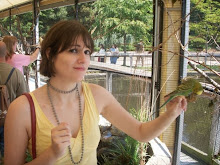
My Architect: A Son's Journey (2004): 7.6/10
My Architect: A Son's Journey, the 2004 documentary made by Nathaniel Kahn about his father, important architect Louis Kahn is a jumbled but fascinating documentary with an added personal touch due to the relationship between the filmmaker and the deceased subject.
I am not normally a fan of the filmmaker of a documentary being overtly present in his own documentary. Herzog’s narration in his films is an exception. While his presence both in narration and on camera feels at times self serving, because of the level to which the films subject relates to him and the film essentially being Kahn’s mission to put together a full picture of his father, his presence is understandable and necessary.
There are two things in the structure of the documentary that is slightly unique to the way the majority of other documentaries function. The first is that instead of cutting back and forth between interviewees, Kahn shows us all of the footage he wants to from an interviewee at once. He also lets the interviews feel more like a conversation in the way he lets the conversations go on and in the way he allows us to hear his questions and their immediate responses. Kahn also has his conversations taking place in a more informal if not constructed and slightly staged environment. Many interviews take place standing up, with both subjects walking and are shot at Louis Kahn’s buildings. This allows the documentary not only to be about Kahn’s mission to discover more about his father but it allows for the simultaneous tribute and appreciation of the architects work. It also helps the interviewee discuss Kahn’s work when they are walking inside or outside of it.
The other aspect of the film that makes Kahn’s documentary slightly unorthodox is that Kahn structures the film by what he found chronologically. Instead of starting from Louis’ birth and moving through his life, as we see bits of interviews that are relevant to the specific aspect or time in Kahn’s life that they discuss, Nathaniel structures the film based on his journey (hence the subtitle) and not as a typical biography. There are moments where Nathaniel inserts scenes of straight forward biographical information which ground the film and allows for the chronological structure.
At the start of the film it felt pretty standard but by the time you get to the end you realize that this is actually is doing something pretty incredible with its exploration of so many relatable and complex aspects of humanity. This idea that Louis Kahn was brilliant because he put all of his time into his work but that it never allowed him to really connect to anyone and as a result he treated the women and children in his life pretty terribly through his neglect. His contribution to architecture though is a result of his neglect of people. His trip to Bangladesh near the end and the man he speaks to is just extremely moving. The scene when he talks to his sister in laws about whether or not they are a family is very interesting. And then we have Nathaniel’s mother who is convinced Louis was coming back to marry her when he died which Nathaniel himself is doubtful of. This is a very well rounded documentary about a man’s life and how his devotion to his work left many others abandoned and one sons journey to come to terms with that.





